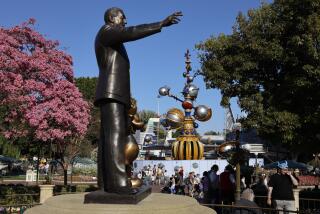O.C. Residents Worry About PCB Readings
State toxic-substance examiners, in tests that were expanded last week, have discovered a cancer-causing compound in the lawns of homes near the Bolsa Chica wetlands, unnerving homeowners who worry about their exposure to the chemicals as well as their tanking property values.
“I would leave in a heartbeat, but I can’t,” said Chris Daly, who two years ago bought a $580,000 home next to a Bankton Drive house where moderate levels of PCBs were discovered in the lawn. “Can you imagine what this has done to the [house’s] value?”
Daly’s neighbor, Mary Ann Cross, has lived in her home for more than two decades, and worries that the contamination investigators found at her home--and on the adjacent land where her three grown children played when they were little--might affect her family’s health.
“I’ve done all this gardening for 25 years, and to think I’ve been bringing [contaminated] dirt in this house that long,” said Cross, whose property was retested last week.
The state Department of Toxic Substances Control found dangerously high levels of PCBs, or polychlorinated biphenyls, earlier this year on two acres of an undeveloped 42-acre plot next to the residential neighborhood where Cross and Daly have homes.
After determining that the levels at the 2-acre site were as much as 3,220 times the federal safety standard, the department mailed notices to 7,500 residents. The area had been fenced previously, after preliminary tests revealed PCB contamination.
In July, the agency tested the lawns at five homes near the site, and found PCBs in the soil at two, both on Bankton Drive in Huntington Beach. Some samples showed moderate to high contamination at the two homes.
Additional tests were conducted at those homes last week, but the findings are not expected for some time.
Thomas M. Cota, chief of the state agency’s Southern California cleanup operations, said, “We’ve met with the property owners and subsequently done some additional sampling to characterize the nature of the contamination. That will be used to develop a cleanup plan.”
Daly said he and some of the other residents plan to pursue legal action if the state’s cleanup plan doesn’t satisfy their concerns. No one has tested his land yet, and no one warned him of the dangers when he bought his home.
“Apparently it has been common knowledge for a long time, but no one told us a thing about it,” he said. “Our kids were playing right in that area until they put that fence up.”
Until being banned nationwide in the 1970s, PCBs were used as industrial lubricants and coolants in large electric transformers. The man-made compound has been shown to cause cancer in animals and is classified a “probable carcinogen” for humans. It can affect the immune, reproductive, neurological and endocrine systems.
It’s unclear how the PCBs got into the soil of the homes or on the adjoining 42-acre plot, known as the Fieldstone property, or how long ago. Regulators speculate that it may have been illegally dumped at the site.
Hearthside Homes, developer of the Bolsa Chica mesa, bought the Fieldstone property for $1.2 million in late 1999, and planned to sell it to the state for the same amount so it could be added to the wetlands restoration project that is underway. Now, it is unclear when that sale will happen.
The developer has entered into a consent order with the state that dictates monitoring and cleanup, which could start in 2003.
The cleanup will probably involve hauling the contaminated soil to a hazardous waste landfill.
“Certainly we are on the hook,” said Lucy Dunn, Hearthside’s executive vice president. “We don’t know ultimately who might contribute to this or who’s responsible for [the contamination].”
More to Read
Sign up for Essential California
The most important California stories and recommendations in your inbox every morning.
You may occasionally receive promotional content from the Los Angeles Times.











